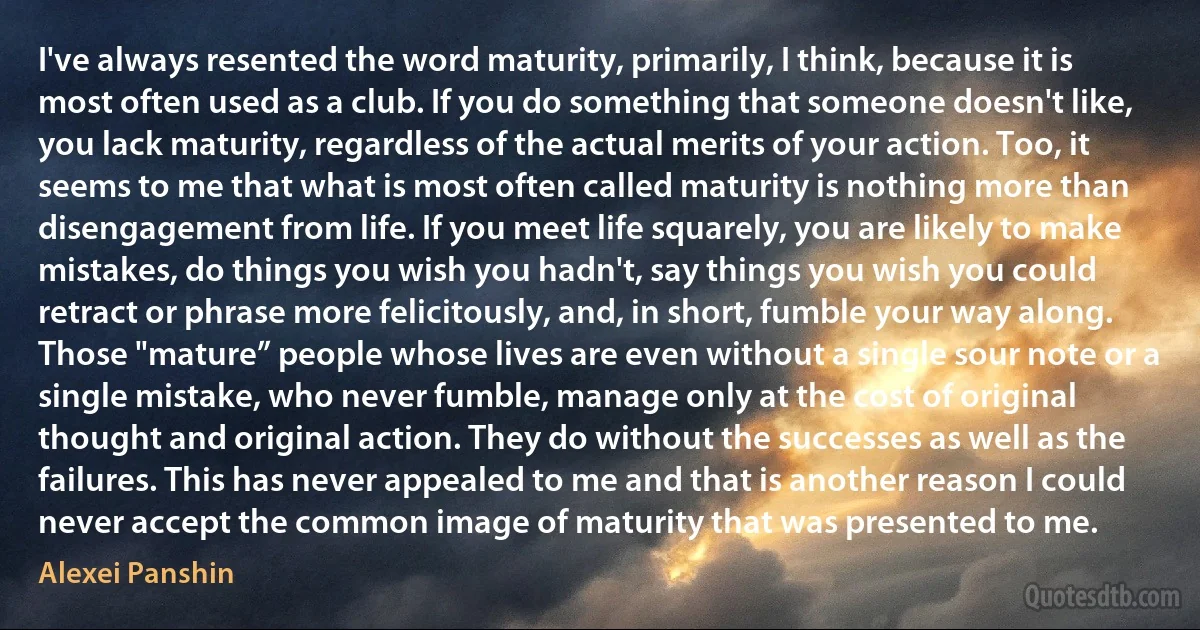
I've always resented the word maturity, primarily, I think, because it is most often used as a club. If you do something that someone doesn't like, you lack maturity, regardless of the actual merits of your action. Too, it seems to me that what is most often called maturity is nothing more than disengagement from life. If you meet life squarely, you are likely to make mistakes, do things you wish you hadn't, say things you wish you could retract or phrase more felicitously, and, in short, fumble your way along. Those "mature” people whose lives are even without a single sour note or a single mistake, who never fumble, manage only at the cost of original thought and original action. They do without the successes as well as the failures. This has never appealed to me and that is another reason I could never accept the common image of maturity that was presented to me.
Alexei PanshinRelated topics
action club common cost disengagement fumble lack lives life likely meet mistake note nothing people reason retract say short single something sour thought think way well wish word someone thingsRelated quotes
Take a moment to remember the times on your own spiritual quest when you felt most enthusiastic. We want to pinpoint the times in which we felt more God conscious and devotional than ever before. Conversely, look at the times when you felt unenthused and do a similar analysis. These questions might help stimulate your thought process: Are you enthusiastic about your existence as a servant of the Lord? Are you enthusiastic to follow the basic principles that will help elevate your consciousness? Are you enthusiastic in the association of saintly people? Are you enthusiastic about what you can experience in your purest state? We must examine our spiritual life on a daily, weekly, and even yearly basis. This examination will help us recognize how various activities and thoughts affect us. We should note how the quality of our experiences varies according to our absorption in the process of bhakti.

Bhakti Tirtha Swami
If Christ were to walk in this world today, do you know what would happen to Him? He would be placed in a mental institution and given psycho-therapy, just as would His Saints. The world would crucify Him today just as it did 2000 years ago, for the world has not learned a thing, except more devious forms of hypocrisy. And what would happen if, in one of my classes at the university, I would one day tell my students that all the learning of this world is of no importance beside the duty of worshipping God, accepting the God-man who died for our sins, and preparing for the life of the world to come? They would probably laugh at me, and the university officials, if they found out, would fire me-for it is against the law to preach the Truth in our universities. We say that we live in a Christian society, but we do not: we live in a society.

Seraphim Rose
For The United States, the leading space faring nation for nearly half a century, to be without carriage to low Earth orbit and with no human exploration capability to go beyond Earth orbit for an indeterminate time into the future, destines our nation to become one of second or even third rate stature. While the President's plan envisages humans traveling away from Earth and perhaps toward Mars at some time in the future, the lack of developed rockets and spacecraft will assure that ability will not be available for many years.
Without the skill and experience that actual spacecraft operation provides, the USA is far too likely to be on a long downhill slide to mediocrity. America must decide if it wishes to remain a leader in space. If it does, we should institute a program which will give us the very best chance of achieving that goal.

Neil Armstrong
So it was that I gave about 1949 my 'Lecture on Nothing' at the Artists' Club on Eighth Street in New York City (started by Robert Motherwell), which predated the popular one associated with Philip Pavia, Bill de Kooning, et al. ). This 'Lecture on Nothing' was written in the same rhythmic structure I employed at the time in my musical compositions (Sonatas and Interludes, Three Dances, etc.). One of the structural divisions was the repetition, some fourteen times, of a single page in which occurred the refrain, 'If anyone is sleepy let him go to sleep.' Jeanne Reynal, I remember, stood up part way through, screamed, and then said, while I continued speaking, 'John, I dearly love you, but I can't bear another minute.' She then walked out. Later, during the question period, I gave one of six previously prepared answers regardless of the question asked. This was a reflection of my engagement in Zen.

John Cage
A true scholarship would examine, and then either accept or reject, with good reason, any new theory which challenges a generally accepted theory admitted to be full of sharp anomalies. However, this has not been the attitude of world scholarship towards our earlier book. The general attitude has been as follows: there is a school of crank scholarship in India which is out to prove, by hook or by crook, that India was the original homeland of the Indo-European family of languages; and the writers of this school deserve to be firmly put in their place. And the best method of doing this is by tarring all scholars who support, or even appear to support, an Indian homeland theory, with one brush; and then pointing out particularly untenable propositions made by one or the other of the scholars so branded together, to prove that all the scholars so named belong to one single school of irrational scholarship.

Shrikant Talageri
